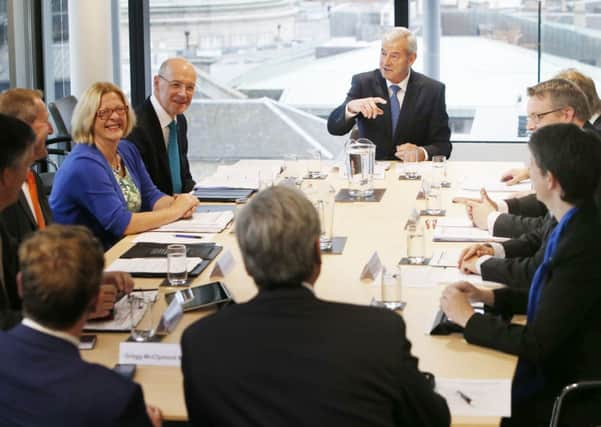Smith Agreement could see Scots paying twice over


Leading economists warned that big accountancy firms could start selling schemes to “avoid Scottish residence” in order to escape higher tax rates.
Holyrood’s devolution committee heard calls yesterday for greater “openness and transparency” in the data available from the UK Treasury to ensure the Scottish Government will not face “secret repercussions” if it puts up taxes.
Advertisement
Hide AdAdvertisement
Hide AdEconomist Professor David Bell said: “There’s a need to make the way the whole system works much more transparent because we’re still going to be relatively exposed to decisions made at Treasury level.”
He said it is possible for two different governments to tax the same “base” of taxpayers living north of the Border, which will happen under Smith.
And he warned: “You can end up with a situation where people – because they’re being taxed on the same tax base twice – they end up being over-taxed.”
The Smith Commission agreement on more powers was published last month in response to the “vow” by David Cameron, Ed Miliband and Nick Clegg during the referendum to give significant new powers to Holyrood in the event of a No vote.
CONNECT WITH THE SCOTSMAN
• Subscribe to our daily newsletter (requires registration) and get the latest news, sport and business headlines delivered to your inbox every morning
The deal said control over tax rates and bands should be transferred to Scotland, along with controls over other taxes such as Air Passenger Duty and some welfare.
David Heald, a professor of accountancy at Aberdeen University and former Treasury adviser, said he had previously called for a Territorial Exchequer Board to ensure key information is made available.
He said: “Without the numbers in the public domain presented in an annual paper to all the Parliamentary assemblies of the United Kingdom, there will always be arguments about whether there has been political fixes to the advantage of some or disadvantage of others.
Advertisement
Hide AdAdvertisement
Hide Ad“I don’t think the finance secretary in Scotland can actually propose an increase in the Scottish income tax rate above the rest of the United Kingdom income tax rate, unless one is sure there will not be punishment through some adjustments to the block grant.”
Prof Heald said just 42,000 Scots are paying more than a fifth of tax, meaning implementation of the scheme will be “very important”. He added: “Just in the same way as big accountancy firms sell corporation tax avoidance schemes, one can imagine they will be selling schemes on how to avoid having Scottish residence – or to get Scottish residence – depending on what the relative tax rates are.”
Michael Keating, professor of politics at the University of Aberdeen, feared that the package had been rushed through.
“I don’t think they amount to a coherent package and the fundamental problem is the circumstances in which the Smith Commission was set up and the timetable that it was given,” he said. “We know the political circumstances in which the vow was made and the timetable was set, but it doesn’t make for good policy-making.”
Charlie Jeffery, professor of politics at the University of Edinburgh, raised concerns about the implementation of the proposals.
He said: “The challenges in that arise from the opportunities that the legislative process in two parliaments gives to question the content of the Smith Commission proposals.
“We have seen voices from within the parties which signed up to the agreement which have criticised it from various directions. There will be opportunity for those criticisms to be voiced and perhaps to gain traction.”
SEE ALSO
SCOTSMAN TABLET AND IPHONE APPS